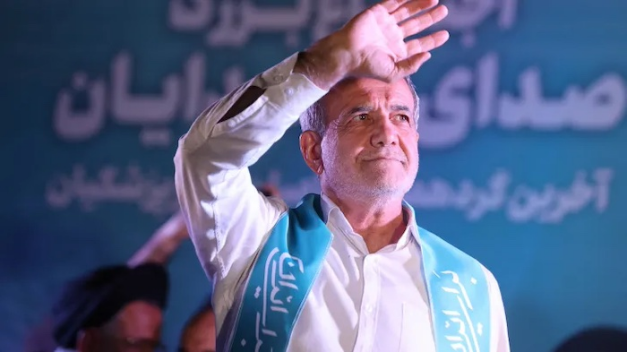
Centrist and Reformist Masoud Pezeshkian Wins Iran’s Presidential Election
Fiona Nanna, ForeMedia News
4 minutes read. Updated 5:00PM GMT Mon, 10 July, 2024
Iran’s president-elect Masoud Pezeshkian has vowed to serve all Iranians, marking the start of what he calls “a new chapter” for the nation. This announcement came after Pezeshkian’s victory over his hardline rival, Saeed Jalili, in a closely contested election run-off.
Speaking from Tehran, Pezeshkian emphasized the upcoming challenges the country faces and his commitment to overcoming them to ensure a prosperous future for all citizens. He delivered these remarks at the mausoleum of Ayatollah Ruhollah Khomeini, highlighting the symbolic importance of unity and national resilience.
Pezeshkian, known for his centrist and reformist stance, secured approximately 16.4 million of the over 30 million votes cast. His opponent, Jalili, garnered around 13.5 million votes. The Ministry of Interior confirmed Pezeshkian’s victory, making him Iran’s next president.
Shortly after the official results, Jalili graciously conceded defeat, urging respect for the election outcome and support for Pezeshkian’s leadership. This concession marks a significant step towards a smoother political transition.
The election results were met with celebrations in the streets by Pezeshkian’s supporters. Internationally, Russian President Vladimir Putin extended congratulations to the new president-elect. However, Western leaders have yet to respond.
The voter turnout in the run-off was 49.8 percent, indicating a closely fought race. Pezeshkian, the sole moderate candidate, faced Jalili, a former nuclear negotiator and advocate for strengthening ties with Russia and China.
The previous ballot on June 28 saw historically low participation, with over 60 percent of voters abstaining from the snap election called after the untimely death of President Ebrahim Raisi in a helicopter crash.
Al Jazeera’s Resul Serdar reported from Tehran that around 50 percent of Iranians abstained from voting due to skepticism about the election’s potential for meaningful change. This sentiment reflects a broader disillusionment with the political system, as some citizens boycotted the election in silent protest.
Pezeshkian is set to assume office within 30 days, pending his resignation from parliament. His official endorsement by Supreme Leader Ayatollah Ali Khamenei and subsequent swearing-in ceremony at the Parliament are the final steps before he formally takes office.
Political analysts suggest that Pezeshkian’s presidency might lead to a more pragmatic foreign policy, potentially easing tensions over stalled negotiations with world powers regarding the 2015 nuclear deal. Both presidential candidates had campaigned on promises to revitalize Iran’s struggling economy, plagued by mismanagement and sanctions reinstated since 2018 by then-President Donald Trump.
Tohid Asadi, a professor at Tehran University, noted that Pezeshkian’s win indicates a public desire for changes in both domestic and foreign policies. However, he cautioned that the president is just one player in Iran’s complex political landscape.
Mostafa Khoshcheshm, a Tehran-based analyst, explained that Iran’s foreign policy decisions are collectively made by the Supreme National Security Council, which includes representatives from various governmental and military sectors. The outcome of the upcoming US presidential election, which could see Joe Biden face off against Trump again, will significantly influence future US-Iran relations.
Ultimately, Pezeshkian will implement policies set by Khamenei, who holds ultimate authority in Iran. As Pezeshkian steps into his new role, his promises of unity and reform will be closely watched both domestically and internationally.
For more insights on Iran’s political landscape and the implications of Pezeshkian’s presidency, click here.

